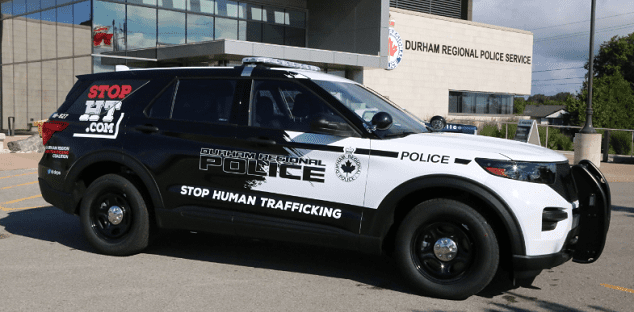Durham Police report steep increase in human trafficking cases from Pickering to Clarington
Published November 18, 2021 at 12:00 pm

Durham Police’s Human Trafficking Unit (HTU) has revealed a steep increase in its investigations since its founding just three years ago.
The unit, which was put together in November 2018 to address a rise in human trafficking cases in Durham, told the Durham Region Police Board this week that cases have risen dramatically since then, numbers that Deputy Chief Dean Bertrim called “alarming.”
The year after the unit was established there was a 94 per cent increase in reported instances of trafficking. That year they filed nearly 300 charges against more than 50 people. More than 100 victims – nearly half minors – were helped during that first year.
Cases rose again over the course of the pandemic, jumping another 14 per cent. In 2020, the HTU investigated 137 cases, with 41 per cent of those involving minors. Bertrim noted that these rates represent cases that “came to our attention,” adding that investigators believe there are “many more victims.”
In 2021, 251 cases were under investigation by September alone, a 161 per cent increase, resulting in 143 charges against 149 suspects, with 226 victims identified More than a third were minors
“This upward trend is alarming,” said Bertrim, “and illustrates that much work and effort is still required.” He called the increase “extremely concerning.”
Bertrim stressed an increase in community engagement as a goal for the HTU, and noted it has nearly doubled in size since its inception, allowing for more opportunity for enforcement and education. The unit is currently made up of two detective and eight detective constables and is led by Detective Dave Davies, a 21 year veteran at DRPS.
A victim service crisis counselor, Karly Church, herself a survivor and well-known speaker on the issue, is embedded on the team acting as a liaison between victims and investigators. Bertrim said Church was “instrumental” in building rapport and trust with the victims and commended her help in providing support to victims and obtaining statements.
Despite increased resources helping more victims than ever the case load continues to grow. “We do have a problem and it’s not just in Durham Region,” Bertrim said. “It’s actually worldwide.”
The community engagement work includes presentation about trafficking to 10,000 high schoolers throughout the region and partnerships with a variety of local services and businesses, such as posters made by Durham College students. A new patrol car is wrapped with information to raise awareness.
The unit is continuing to step up efforts and have lobbied the Attorney General for a dedicated crown prosecutor to focus on human trafficking cases and advise investigators.
They also received numerous grants to continue to expand, such as a “proceeds of crime” HALT grant and the Children at Risk of Exploitation (CARE) pilot project, which awarded the HTU granted the HTU more than $3 million.
CARE units pair police officers and child protection workers to proactively find and engage with children deemed at high risk of exploitation. The children are then removed from danger and connected to support. CARE units also supplement, rather than replace, other units to assist in investigations.
“Durham Region is particularly attractive to human traffickers as part of the GTA, close to Toronto, all the 400 series highways,” Bertrim said.
“Human trafficking thrives on the anonymity,” he added, stressing the need for both enforcement and education to empower victims to come forward. “It has gone unnoticed because very few victims will ever come forward.”
insauga's Editorial Standards and Policies advertising





